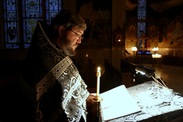
During the First Week of the Great and Holy Fast, as it is customary - the Reading of the Canon of St. Andrew of Crete was preformed. The Great Canon of St Andrew, Bishop of Crete, is the longest canon in all of our services, and is associated with Great Lent, since the only times it is appointed to be read in church are the first four nights of Great Lent (Clean Monday through Clean Thursday, at Great Compline) and at Matins for Thursday of the fifth week of Great Lent, when it is read in its entirety.
There is no other sacred hymn which compares with this monumental work, which St Andrew wrote for his personal meditations. Nothing else has its extensive typology and mystical explanations of the scripture, from both the Old and New Testaments. One can almost consider this hymn to be a “survey of the Old and New Testament”. Its other distinguishing features are a spirit of mournful humility, hope in God, and complex and beautiful Trinitarian Doxologies and hymns to the Theotokos in each Ode.
The canon is a dialog between St. Andrew and his soul. The ongoing theme is an urgent exhortation to change one’s life. St Andrew always mentions his own sinfulness placed in juxtaposition to God’s mercy, and uses literally hundreds of references to good and bad examples from the Old Testament and New Testament to “convince himself” to repent.
Source: www.orthodox.net
There is no other sacred hymn which compares with this monumental work, which St Andrew wrote for his personal meditations. Nothing else has its extensive typology and mystical explanations of the scripture, from both the Old and New Testaments. One can almost consider this hymn to be a “survey of the Old and New Testament”. Its other distinguishing features are a spirit of mournful humility, hope in God, and complex and beautiful Trinitarian Doxologies and hymns to the Theotokos in each Ode.
The canon is a dialog between St. Andrew and his soul. The ongoing theme is an urgent exhortation to change one’s life. St Andrew always mentions his own sinfulness placed in juxtaposition to God’s mercy, and uses literally hundreds of references to good and bad examples from the Old Testament and New Testament to “convince himself” to repent.
Source: www.orthodox.net






